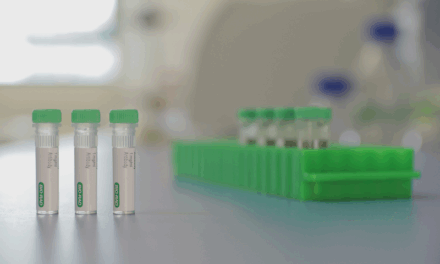Beckman Coulter Life Sciences, Indianapolis, is striving to take the detection of rare, abnormal events in blood disorders a step forward, with the introduction of advanced and highly discriminative antibody panels. DuraClone RE antibody panels provide tools to study low-frequency populations of abnormal CD5+ B cells (RE CLB), abnormal plasma cells (RE PC), or abnormal B progenitor cells (RE ALB).
The three new standardized, preformulated DuraClone RE kits deliver high sensitivity for rare cell populations, and are able to accommodate either large sample volumes or high cellular concentrations. Using dry, unitized antibody combinations helps preserve the strict assay conditions essential for reliable, reproducible rare event analysis.
The DuraClone family of dry reagents simplifies sample preparation and handling. The panels eliminate errors from manual antibody pipetting, streamline workflow, improve turnaround time, and simplify inventory management. The kits are stable at room temperature, even when opened, and are easy to transfer between laboratories. The first Duraclone standardized dry, preformulated panels were introduced in 2014 to support research into the human immune system. Since then, the company has added DuraClone IM and IF panels for investigating immune profiles and function.
“Research of rare abnormal cells associated with blood disorders is powerful, yet challenging to perform,” explains Mario Koksch, vice president and general manager of Beckman Coulter’s cytometry business unit. “Beckman Coulter is recognized for the quality of its reagents; and we recognize that preserving strict assay conditions is integral to rare event analysis. This has led to the development of our next-generation DuraClone RE kits, produced in collaboration with experts from leading clinical research laboratories.”
Koksch adds, “They told us that streamlined workflow and standardization of results were essential to the experimental robustness of their longitudinal and multicentric research into blood disorders.”
Internationally recognized scientist Karl-Anton Kreuzer, MD, from Germany’s Center for Integrated Oncology, Cologne, has recently carried out a trial using the kits, and believes that DuraClone RE CLB panels will significantly simplify rare event analysis in the clinical research lab. “The inclusion of ROR-1 as a new discriminative marker has markedly facilitated the screening for low frequencies of abnormal B cells.”
Lutz Uharek, MD, from the stem cell facility at Charité Universitätsmedizin, Berlin, Germany, explains, “Our work in clinical research is focused on novel cellular and immune approaches to target blood cell disorders. To drive this further, we found the DuraClone panels provided a sensitive, analytically reliable and economic tool for the detection of minute, abnormal plasma cell populations.”
DuraClone RE antibody panels are available in a convenient 25-test package containing three complete compensation kits specific for each panel. They offer the flexibility of additional antibody drop-in slots, making it possible to answer a customer’s specific questions. Further additions to the DuraClone product family are in development, including dry stimulation cocktails for functional assays. DuraClone RE panels are for research use only.
For more information, visit Beckman Coulter.






